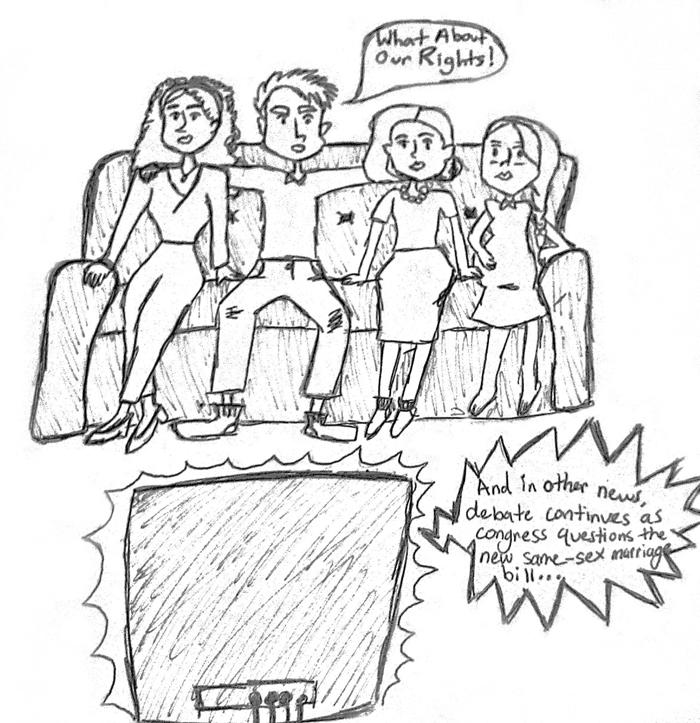
With the economy undergoing the worst downturn since the Great Depression, there are those who question whether to fully recognize same-sex marriage is a serious matter or a wedge issue among voters.
The debate is not simply an issue of semantics. To be certain, the economic factors are important, and the issue of marriage is hardly a trivial matter. Nor is the issue simply about same-sex versus heterosexual marriage, as history shows us. Take, for example, the case of polygamists in the early Mormon community.
During the early 19th century the Mormons, followers of the Church of Latter-day Saint were harassed by their fellow Americans. On several occasion, this harassment escalated to skirmishes, and it was not uncommon for them to be deemed unwanted and chased out under the threat of the bayonet.
Were Mormons then law-breakers? Were they uncivilized heathens that practiced cannibalism? No. They were patriotic Americans and God-fearing Christians.
Unfortunately for them, they also practiced polygamy, when a man can have multiple wives, and for this they were despised enough to justify violence against them. These polygamous marriages were entered voluntarily, and the Mormons did not attempt to force their views on others. At worst, they might offer to teach you about their church if you were curious.
This didn’t matter to their fellow Americans though, and violence continued.
After their lands were confiscated from Missouri in the 1838 Mormon War, and the death of their founder in the Mormon-Illinois War, the Mormon people moved westward in search of a place where they could live in peace. They came to found Salt Lake City and began to form the state of Deseret (later to become the Utah territory).
Did they finally find a small measure of peace in the west? No. Back East, the public was still outraged at the Mormon church and its polygamy.
In the late 1850s, President James Buchanan ordered an expedition to be sent to attack the Mormons. The Mormons feared that they would be massacred and prepared to fight — not only for their right to marry as they saw fit — but to fight for their very right to live.
Luckily, the war had only a few skirmishes before peace was negotiated. A line had been drawn though, the United States was willing to use military force to enforce its vision of marriage. Under the terms of peace, the LDS Church was forced to accept government jurisdiction – which effectively meant accepting the end of legal polygamy.
A few brave Mormons attempted to fight this intrusion on their private lives, but were defeated in the Supreme Court, which upheld a federal prohibition against polygamy. To this day, polygamists are victims of raids by federal, state and local law enforcement agencies. Whereas same-sex marriage is legal in some jurisdictions of the United States, polygamy continues to be illegal in all fifty states. The Green, Libertarian, and Democrat parties are all in favor of same-sex marriage, but no political party, with the exception of the Libertarian Party, has argued in defense of polygamy.
Is the issue of marriage a wedge issue? I would argue not. A wedge issue is a frivolous issue that has little bearing on the day-to-day lives, but used nonetheless to distract the voting electorate from more important issues.
The marriage debate would be a wedge issue if there were no violence or unequal treatment. As it stands right now though polygamous and same-sex marriage are both denied access to government benefits given only monogamous same-sex marriage. These denied-benefits include, but are not limited to, tax benefits, the privilege of adoption and easements in immigration policy. Did you know that until the 1990s you couldn’t migrate legally if you were gay? What horror!
More importantly though, the case of the Mormons shows that the United States have been willing to use military might in the past to enforce what they deem as being the rightful form of marriage. If the United States were willing to use military force in the past to settle the issue, should we not be concerned that they might do so again in the present?
I myself am a member of the Roman Catholic Church and believe that marriage is the union between one man and one woman. As an American though, it is intolerable to allow the United States to harm my fellow Americans for how they live their private lives.
Even if one has reservations about same-sex or polygamous marriage, they should not use the government to enforce their view. To do so is to introduce violence into the debate on marriage – and that is un-American.
—Michelangelo Landgrave is President of the CSUN Libertarian Club, an illegal alien from Mexico, a Whovian and a student of Economics.





